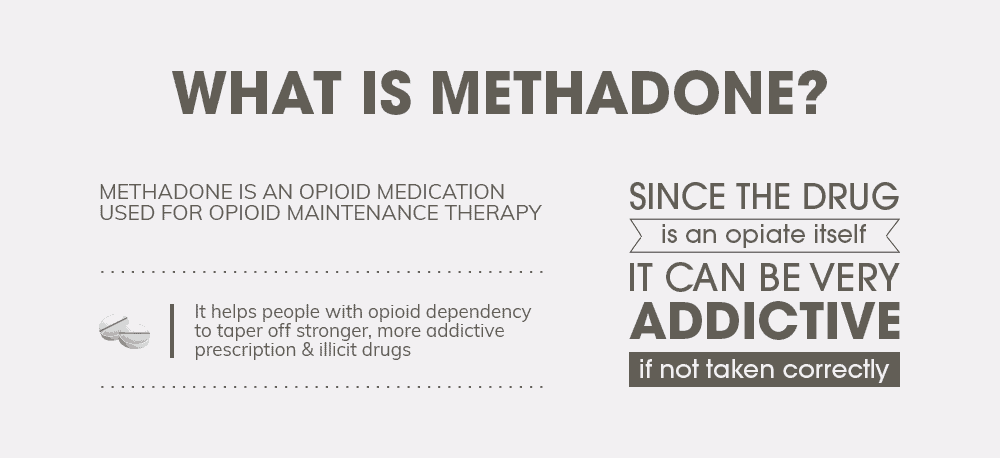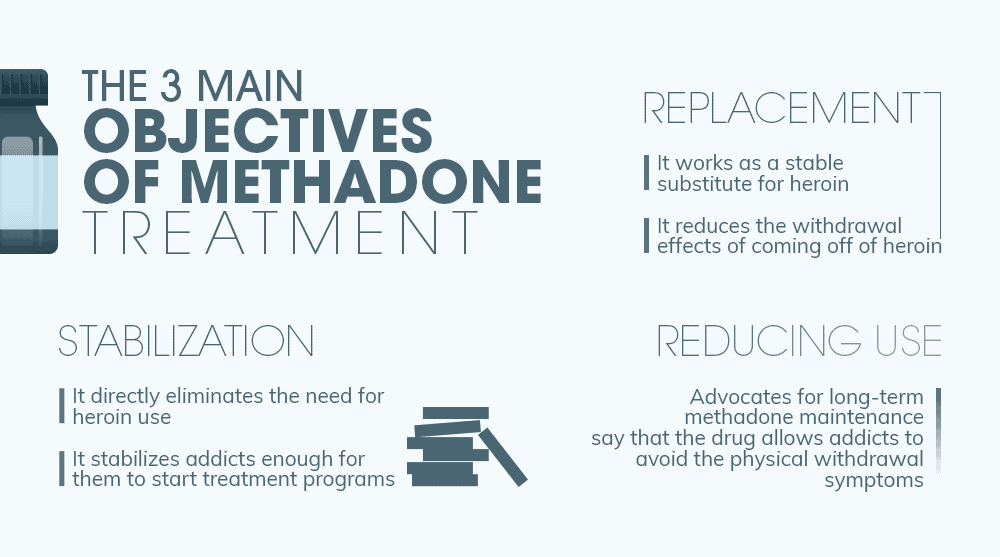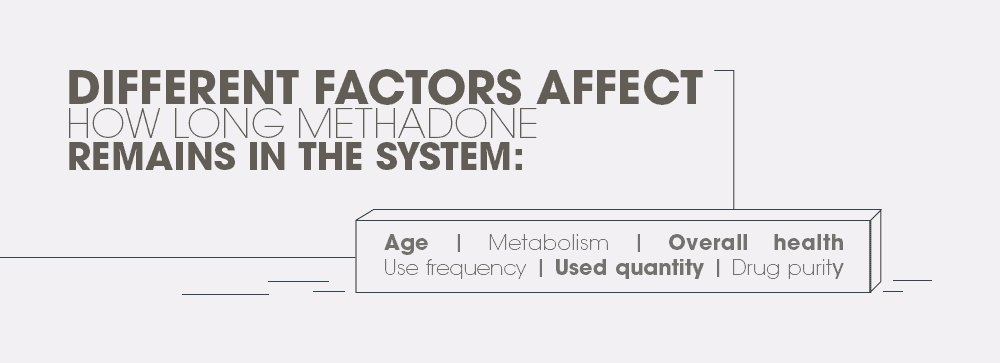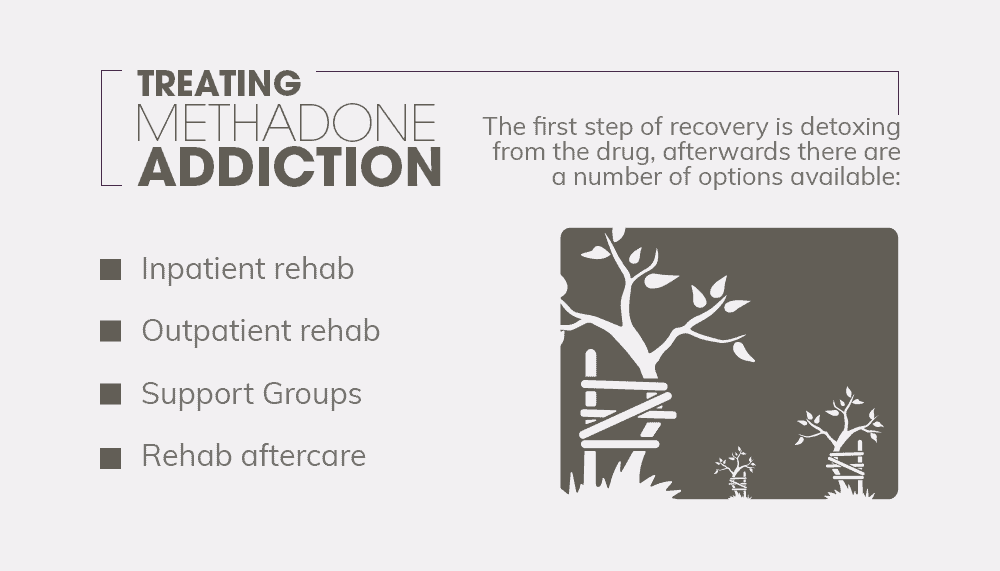He’s halfway sick and halfway stoned.He’d sure like to kick, but he’s too far gone.So they wind him down with methadone. ~ James Taylor, “A Junkie’s Lament” Methadone treatment for heroin and opioid addiction recovery has become increasingly popularized since it was first introduced as a treatment option around half a century ago. Many people on the path to recovery use methadone around the country to help manage the withdrawal symptoms associated with drug rehab and meth addiction treatment. There is one clear benefit to methadone treatment: namely, it reduces the discomfort of withdrawal by acting as an opioid replacement therapy.
However, not all is bright and rosy when it comes to replacing the addictive properties of heroin and other opioids with its alternative. Instead, methadone treatment is also associated with quite a few pitfalls, which is why many meth treatment centers choose not to utilize this kind of replacement treatment at all. Our goal here is to present a fair view of methadone, including an overview of how it is used in addiction treatment as a whole. In this post, we address all of the following related questions:
- What is methadone and what does it treat?
- How does opioid replacement therapy work?
- Does methadone treatment reduce opioid dependence?
- What are the benefits of methadone treatment?
- What are the drawbacks of using methadone for opioid addiction treatment?
- How does methadone treatment work with other recovery tools?
- Are there alternatives to opioid replacement therapy?
By way of clarification, Ashwood Recovery does not use methadone in treating heroin and opioid addiction, nor does it use any other form of replacement drug therapy. However, we want to keep this discussion as objective as possible, weighing methadone treatment from various perspectives to give you the information that you need to make the decision for yourself. If you still have questions on this topic, you should feel free to contact us at any time.
Methadone Treatment: The Basic Benefits of Replacement Treatment
Even though it is a common means of medically managing heroin rehab and addiction recovery, some people do not necessarily understand how methadone treatment works. In simple terms, the idea behind methadone is to decrease individuals’ dependency on heroin (along with its ‘high’), reduce their use of the drug altogether, and stabilize them to the point of being in a better position for treatment programs. Methadone accomplishes this by literally replacing many of the effects of heroin in those who use it. The drug affects the central nervous system and the brain in much the same way as heroin (also an opioid) but has the medical benefit of not inducing a state of euphoria – the ‘high’ that works to make heroin so addictive in the first place. 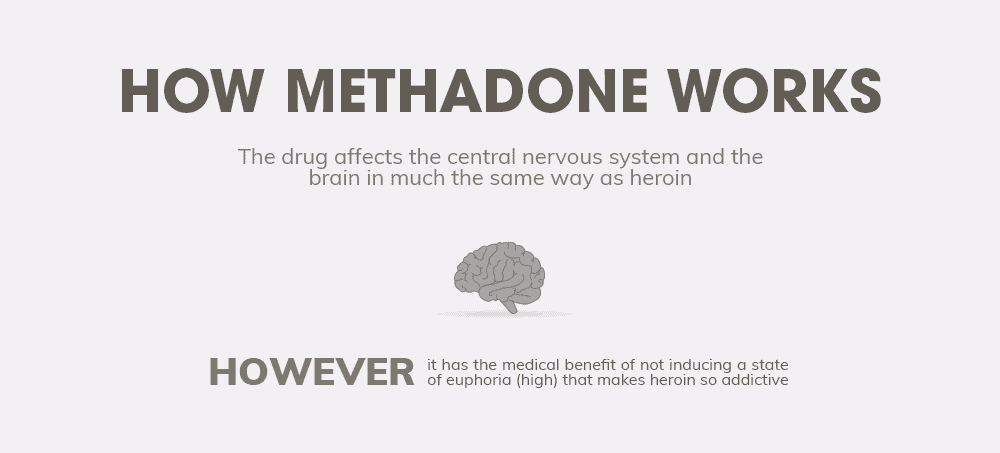
“Currently, the major form of medical therapy for heroin dependence internationally involves orally administered methadone. [Some researchers] believed that long-term heroin use caused a permanent metabolic deficiency in the central nervous system and an associated physiological disease, which required regular administration of opiates to correct the metabolic deficiency. At the basis of methadone maintenance treatment is the observation that opioid analgesics can be substituted for one another. Methadone at adequate doses prevents or reverses withdrawal symptoms, and thus reduces the need to use illegal heroin. Methadone remains effective for approximately 24 hours, requiring a single daily dose rather than the more frequent administration of three to four times daily which occurs with the shorter-acting heroin. Methadone can block the euphoric effects of heroin, discouraging illicit use and thereby relieving the user of the need or desire to seek heroin. This allows the opportunity to engage in normative activities, and rehabilitation if necessary.”
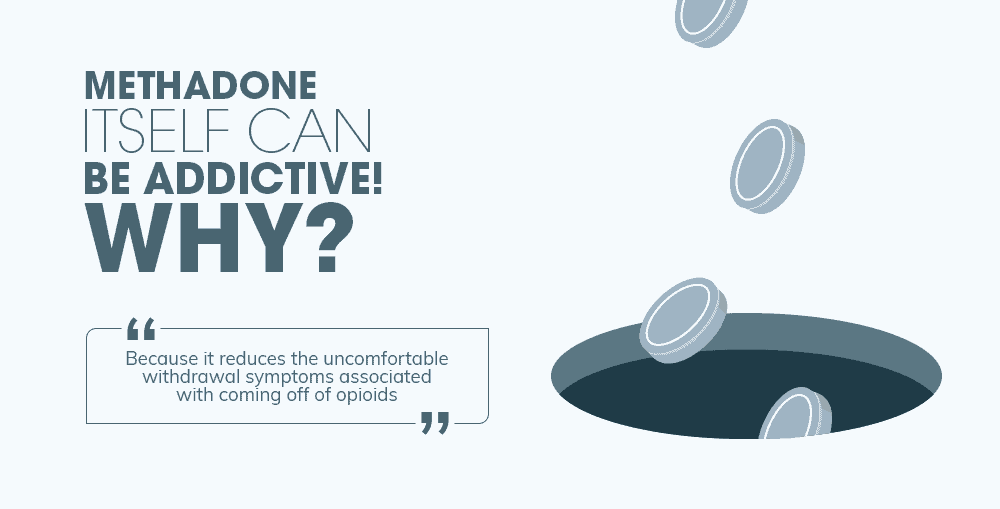
- Replacement: Methadone reduces the withdrawal effects of coming off heroin addiction, since the opioid drug replaces the way heroin acts within the brain and body. Opioid analgesics can be substituted, and methadone works as a stable substitute for heroin (an opioid at its core). Methadone can be administered in a monitored environment and reduce the uncomfortable effects of withdrawal, which can encourage addicts to get the help that they need for recovery in the first place.
- Stabilization: Methadone treatment allows those looking for treatment a stable means of receiving the psychological and clinical help that they need. The idea is that methadone directly eliminates the need for heroin use, stabilizing addicts as they enter into treatment programs and drug rehab facilities. Rather than facing intense cravings and physical symptoms, patients are stabilized by methadone and able to instead focus on developing long-term coping strategies for long-term recovery. Because of this stabilization, some professionals have pointed to methadone as increasing the chances of successful long-term recovery.
- Reducing Use: Some professionals advocate for the long-term use of methadone as a medically supported maintenance of sobriety. Since methadone doses are needed only every 24 hours, and because the drug is legal, this form of opioid ostensibly represents a much safer option for those who are already chemically dependent on opioids. Methadone does not result in the same ‘high’ as heroin, which makes illicit use unlikely. Advocates for long-term methadone maintenance state that the drug allows addicts to avoid the physical withdrawal symptoms while maintaining normal daily lives.
The Drawbacks of Relying on Methadone Treatment for Heroin Rehab
Just as with nearly anything in the world as a whole, using methadone for treatment is far from a one-sided issue in the world of addiction recovery specifically. While some may deny it, methadone itself can be addictive simply because it reduces the uncomfortable withdrawal symptoms associated with coming off of opioids. This is half of where addiction stems from; initially it may be because of the euphoria caused by heroin, but eventually, addiction comes from your body communicating the ‘need’ for opioids by way of withdrawal symptoms. The same applies to methadone treatment, which is why addiction to methadone occurs all the time. 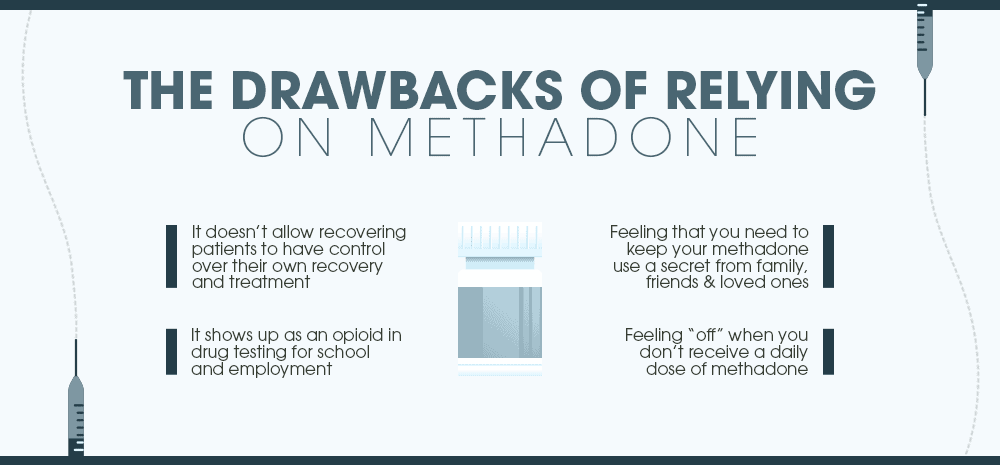
- The use of methadone does not allow recovering patients to have control over their own recovery and treatment.
- Maintaining methadone treatment over the long-term requires daily visits to the methadone clinic, which may be difficult or even prohibitive for those in recovery with busy lives.
- Using methadone does not eliminate the possibility of using other illicit opioids, and in fact, allows the continued use of these opioids for the ‘high’ while avoiding the withdrawal symptoms of detoxification.
- Methadone shows up as an opioid in drug testing for school or for employment.
- Feelings of shame or disappointment that you need to be taking methadone as a means of staying away from heroin.
- Feeling that you need to keep your methadone use a secret from family, friends and loved ones.
- The continuation of addiction on a smaller scale – feeling “off” when you do not receive the daily dose of methadone.
It is because of the potential for these negative physical, emotional and psychological effects of medically managed addiction treatment that methadone is distributed only under strict protocol through daily visits to a methadone clinic. Methadone can potentially be a useful tool for people who have been dependent on opioids for a very long time, but turning to the drug as a means of recovering from addiction as a whole should be very carefully considered.
Consider Your Options: Replacing Replacement Treatment
Even after weighing both the pros and cons of methadone as a form of treatment in addiction recovery, you may be left wondering what other alternatives there are for overcoming addiction to heroin. Because many may be asking that question, it is worth noting here that there are addiction treatment programs that do not utilize medication for treatment at all. For instance, intensive outpatient programs (IOPs) typically focus on the behavioral effects of addiction rather than the neurological factors that contribute to it. With this focus, intensive outpatient programs are able to equip those struggling with heroin addiction with everything that they need to have a successful recovery from addiction – without the need for methadone maintenance. IOPs take recovery further than simply attending support groups and discussions. Instead, these programs often involve an intense combination of one-on-one therapy sessions (with the use of cognitive behavioral therapy), group support sessions, workshops for building coping skills in sobriety, and the opportunity to receive support from family and loved ones on a weekly basis. This combination makes a lasting recovery that much more likely, as it addresses addiction from a holistic perspective rather than simply managing the addiction through replacement medication. Both intensive outpatient programs and inpatient addiction treatment take those looking to recover from heroin addiction from A to Z, equipping them with the tools and strategies that they need to stay sober independently, without clinical support. It is up to you which option you would prefer for your own recovery from addiction. Deciding whether or not to use methadone as a means of getting heroin addiction under control is not necessarily an easy decision. Hopefully, this discussion gave you most of the information that you need to make an informed decision regarding replacement drug therapy as a form of addiction treatment. If you still have questions about methadone treatment or even a story to tell about drug replacement therapy, feel free to either leave a comment in the section below or contact us today.
What Did you Think About This Blog?
Give it a Rating!


